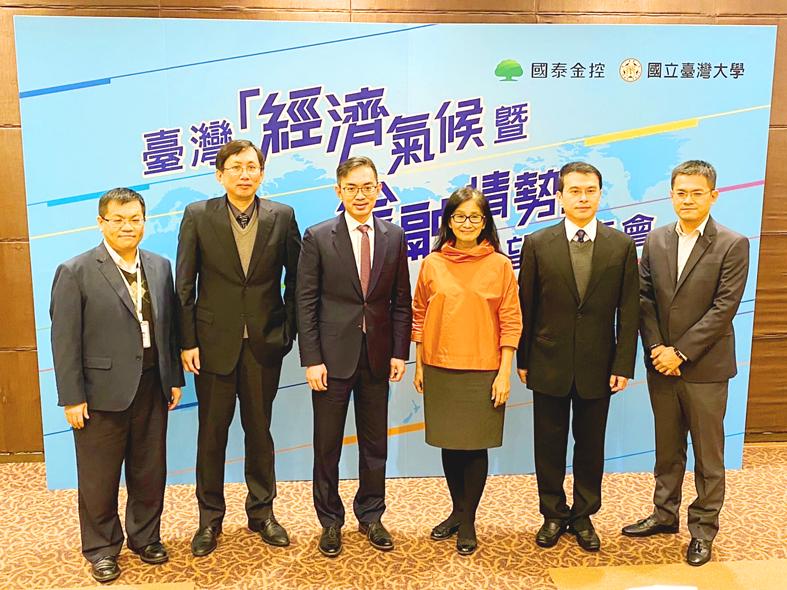Cathay Financial Holding Co (國泰金控) yesterday raised its GDP growth forecast for Taiwan to 6.1 percent for this year and 3.9 percent for next year, citing a recovery in private consumption and continued growth in exports.
In September, the firm forecast growth of 5.6 percent for this year and 3.5 percent for next year.
Although the uncertainty of the COVID-19 pandemic persists, domestic consumption has significantly recovered in the fourth quarter, alleviating most economists’ main concerns regarding the local economy this year, said National Central University economics professor Hsu Chih-chiang (徐之強), who heads a research team commissioned by Cathay Financial.

Photo: Allen Wu, Taipei Times
Retail sales rebounded to NT$373 billion (US$13.46 billion) in October and NT$375.4 billion last month, following five consecutive months of annual decline due to the implementation of a level 3 COVID-19 alert starting in May, Ministry of Economic Affairs data showed.
Despite power rationing in China and a slowing economy in the US, the nation’s exports in the fourth quarter continued to increase by a double-digit percentage thanks to robust demand for technology products amid a digitalization trend, Cathay Financial said.
Since June, exports have hit record highs, with total outbound shipments in the first 11 months of the year advancing 30 percent to US$405.7 billion from a year earlier, Ministry of Finance data showed.
“Next year, we expect domestic consumption to be the driver of economic growth. Exports are expected to keep their growth momentum, but are likely to grow at a slower pace due to this year’s high comparison base,” Hsu said.
Cathay Financial forecast that Taiwan’s economy would expand 3 percent in the first half of next year and 5 percent in the second half, he added.
Next year, the central bank is likely to raise interest rates, given that the US Federal Reserve plans to do so in June at the earliest and considering the rise in inflation, Hsu said.
“It has been 10 years since the last time that the central bank raised its rates, and according to the rule of thumb, it usually hikes rates at a slower pace than when it lowers rates,” he added.
The central bank is likely to raise rates multiple times by 12.5 basis points each time, unless inflation becomes more severe, he said.

UNCERTAINTY: Innolux activated a stringent supply chain management mechanism, as it did during the COVID-19 pandemic, to ensure optimal inventory levels for customers Flat-panel display makers AUO Corp (友達) and Innolux Corp (群創) yesterday said that about 12 to 20 percent of their display business is at risk of potential US tariffs and that they would relocate production or shipment destinations to mitigate the levies’ effects. US tariffs would have a direct impact of US$200 million on AUO’s revenue, company chairman Paul Peng (彭雙浪) told reporters on the sidelines of the Touch Taiwan trade show in Taipei yesterday. That would make up about 12 percent of the company’s overall revenue. To cope with the tariff uncertainty, AUO plans to allocate its production to manufacturing facilities in

Taiwan will prioritize the development of silicon photonics by taking advantage of its strength in the semiconductor industry to build another shield to protect the local economy, National Development Council (NDC) Minister Paul Liu (劉鏡清) said yesterday. Speaking at a meeting of the legislature’s Economics Committee, Liu said Taiwan already has the artificial intelligence (AI) industry as a shield, after the semiconductor industry, to safeguard the country, and is looking at new unique fields to build more economic shields. While Taiwan will further strengthen its existing shields, over the longer term, the country is determined to focus on such potential segments as

TAKING STOCK: A Taiwanese cookware firm in Vietnam urged customers to assess inventory or place orders early so shipments can reach the US while tariffs are paused Taiwanese businesses in Vietnam are exploring alternatives after the White House imposed a 46 percent import duty on Vietnamese goods, following US President Donald Trump’s announcement of “reciprocal” tariffs on the US’ trading partners. Lo Shih-liang (羅世良), chairman of Brico Industry Co (裕茂工業), a Taiwanese company that manufactures cast iron cookware and stove components in Vietnam, said that more than 40 percent of his business was tied to the US market, describing the constant US policy shifts as an emotional roller coaster. “I work during the day and stay up all night watching the news. I’ve been following US news until 3am

COLLABORATION: Given Taiwan’s key position in global supply chains, the US firm is discussing strategies with local partners and clients to deal with global uncertainties Advanced Micro Devices Inc (AMD) yesterday said it is meeting with local ecosystem partners, including Taiwan Semiconductor Manufacturing Co (TSMC, 台積電), to discuss strategies, including long-term manufacturing, to navigate uncertainties such as US tariffs, as Taiwan occupies an important position in global supply chains. AMD chief executive officer Lisa Su (蘇姿丰) told reporters that Taiwan is an important part of the chip designer’s ecosystem and she is discussing with partners and customers in Taiwan to forge strong collaborations on different areas during this critical period. AMD has just become the first artificial-intelligence (AI) server chip customer of TSMC to utilize its advanced